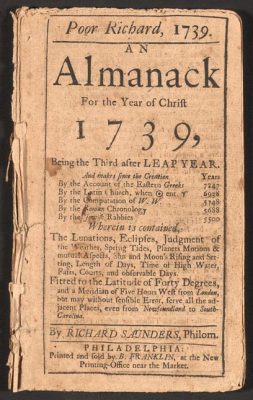Poor Richard’s Almanac is a collection of weather reports, horoscopes, poems, facts, and sayings compiled by American Benjamin Franklin. The book was first published in 1732 and continued to be published until 1758. It was very popular during its time, with some printings selling as many as 10,000 copies.
History
Franklin chose the name “Richard Saunders” for the persona who would write the Almanack. He got the pseudonym from rearranging the name of Cardanus Rider, the author of the popular almanac Rider’s British Merlin. However, Richard Saunders did exist, and he was a popular physician and astrologer. Franklin was essentially profiting from another man’s name by using his fame and credibility to sell his own work. Richard even mentions Franklin’s printing services, stating that it was the shop where he always goes to have his almanacs printed.
After a few editions, the original Richard Saunders gradually disappeared, replaced by “Poor Richard,” a working-class man from the countryside who was pious and dispensed homespun philosophical wisdom in proverbial sayings. He also modeled Poor Richard’s personality from Jonathan Swift’s pseudonymous character, Isaac Bickerstaff, who was known for his wit and satire. Regardless of the name he used, the almanac’s creation fulfilled its main intent. It successfully marketed Franklin’s printing business.
Content
The almanac contained weather predictions, horoscopes, advice on how to live a moral life, and other useful information typical of almanacs of that time. It had content that was both religious and superstitious. While most people of his time were Christian, many believed in astrology or, at the very least, found them entertaining to read. Franklin also included the occasional mathematical exercise; the almanac from 1750 featured an early example of demographics. It even featured stories in a serial format intended for readers to follow from one installment to the next, motivating them to buy each edition year after year.
But Poor Richard’s Almanac is chiefly remembered for being a repository of Franklin’s aphorisms and proverbs, which were often cynical or humorous maxims that advised readers on everything from marriage to frugality. Many of these sayings still live on in American English today, such as:
- “A penny saved is two pence clear.”
- “God helps those who help themselves.”
- “Early to bed, early to rise makes a man healthy, wealthy, and wise.”
Reception
The almanac was very popular with the people. It wasn’t the first almanac but it outsold all the other almanacs in Philadelphia. Some editions were even translated into Russian, Gaelic, Chinese, Bohemian, Polish, Catalan, and Welsh. Poor Richard’s Almanac became the second most popular publication of its time, only behind the Bible.
It helped Franklin’s business and made him one of the wealthiest men in Pennsylvania. People appreciated the almanac because it was entertaining and useful. Franklin’s sayings, in particular, were memorable, and many of them are still used today.
However, not everyone was a fan. Franklin’s contemporaries, such as Thomas Paine, Thomas Jefferson, and John Adams, thought that the almanac was too moralistic and that it promoted conformity instead of new freedoms. They saw it as a reflection of the social norms of their time rather than a philosophical document setting a path for change.
A biographer even asserted that Franklin did not borrow the name of Richard Saunders, he stole it. Poor Richard Saunders (no pun intended) was not alive to either give Franklin permission or send him a lawsuit. Franklin simply took the name and used it to sell his almanacs.
In fact, the almanac’s name itself was similar to an earlier publication called “Poor Robin’s Almanack” published by Franklin’s own brother, James Franklin. Regardless, Poor Richard’s Almanac was a popular and influential publication that helped establish Benjamin Franklin as a well-known figure in America and abroad.
